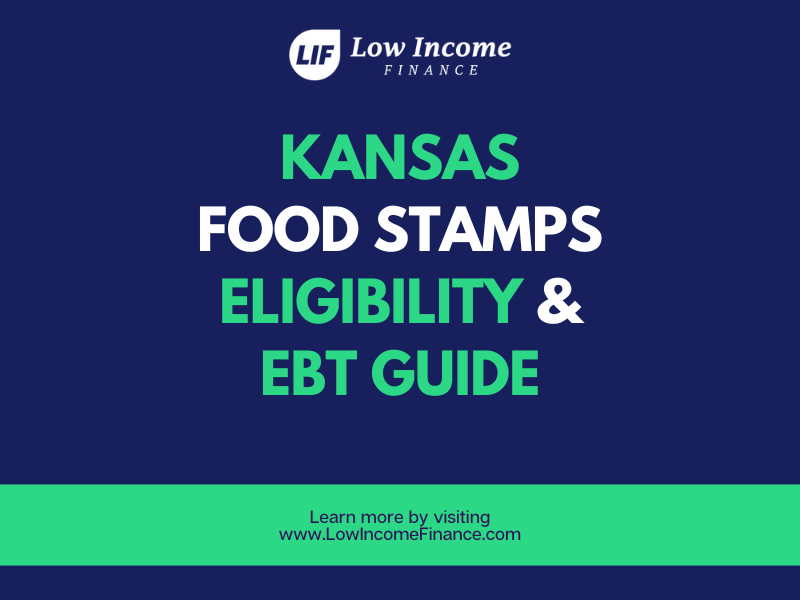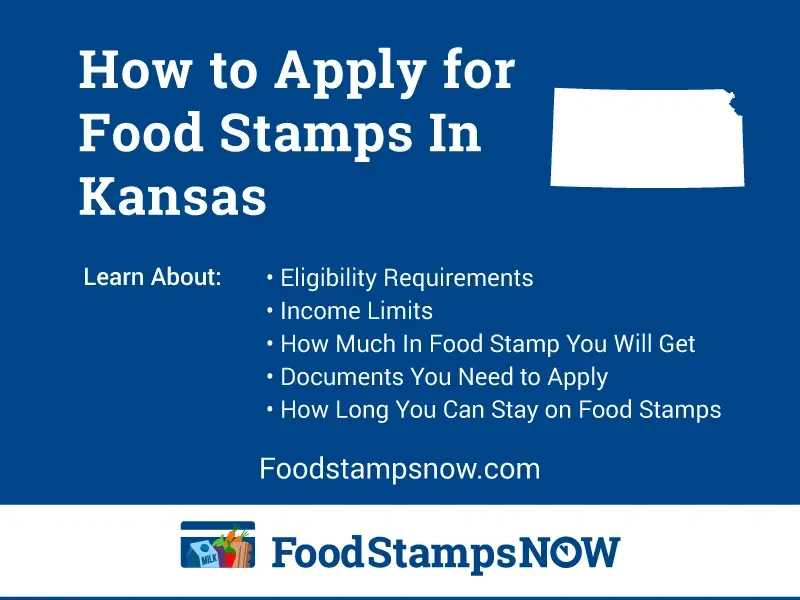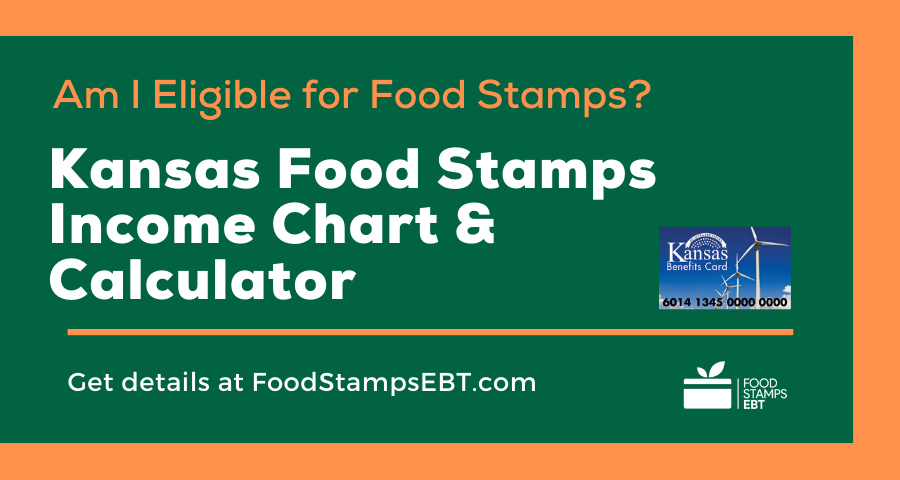Dive into the realm of Kansas Food Stamps, where we unravel the intricacies of this crucial program. From eligibility criteria to application processes, and the myriad benefits it offers, this guide serves as your compass through the world of food assistance.
Unveiling the intricacies of Kansas Food Stamps, this guide delves into the eligibility requirements, providing clarity on income and asset limits, as well as work-related stipulations. It meticulously Artikels the application process, guiding you through the necessary steps, documentation, and timelines involved.
Eligibility for Kansas Food Stamps
To qualify for food stamps in Kansas, you must meet certain eligibility requirements, including income limits, asset limits, and work requirements.
To determine your eligibility, the Kansas Department for Children and Families (DCF) will consider your household’s income, assets, and expenses. Your household includes you, your spouse, and any children under the age of 21. If you are a single parent, your household also includes any children under the age of 18 who live with you.
Income Limits
To be eligible for food stamps in Kansas, your household’s income must be below certain limits. The income limits vary depending on the number of people in your household. For example, in 2023, the gross income limit for a one-person household is $1,729 per month.
For a two-person household, the gross income limit is $2,322 per month. You can find the current income limits on the DCF website.
Asset Limits
In addition to income limits, you must also meet certain asset limits to be eligible for food stamps in Kansas. The asset limits vary depending on the number of people in your household. For example, in 2023, the asset limit for a one-person household is $2,500. For a two-person household, the asset limit is $4,000. You can find the current asset limits on the DCF website.
Work Requirements
Able-bodied adults without dependents between the ages of 18 and 49 must meet certain work requirements to be eligible for food stamps in Kansas. These individuals must work at least 20 hours per week or participate in a workfare program.
You can find more information about the work requirements on the DCF website.
Application Process for Kansas Food Stamps
Applying for food stamps in Kansas is a simple process that can be completed online, by mail, or in person. Here’s a step-by-step guide to help you through the application process:
How to Apply
- Online:You can apply online through the myBenefits portal at https://mybenefits.ks.gov/.
- By Mail:Download the application form from the Kansas Department for Children and Families (DCF) website and mail it to the address provided.
- In Person:Visit your local DCF office to apply in person. You can find the address of your nearest office on the DCF website.
Required Documentation
When applying for food stamps, you will need to provide documentation to verify your identity, income, and household composition. Some of the documents you may need include:
- Social Security number
- Proof of income (e.g., pay stubs, bank statements)
- Proof of residency (e.g., utility bill, lease agreement)
- Proof of identity (e.g., driver’s license, passport)
Processing Times
The processing time for food stamp applications varies depending on the method of application and the complexity of the case. However, you can expect a decision on your application within 30 days.
For those in Kansas who rely on food stamps, exploring food truck names can provide creative inspiration. Food trucks offer a diverse range of cuisines and flavors, catering to various dietary needs and preferences. Whether it’s a classic cheeseburger or a tantalizing fusion dish, food trucks in Kansas offer a convenient and affordable way to supplement your food assistance.
So, venture out, sample the culinary delights, and find a food truck name that resonates with your Kansas food stamps experience.
Benefits of Kansas Food Stamps

Food stamps, also known as the Supplemental Nutrition Assistance Program (SNAP), provide a range of benefits to families and individuals in Kansas who meet the eligibility criteria. These benefits can help improve nutritional outcomes, reduce food insecurity, and promote overall well-being.
Improved Nutritional Intake
- Food stamps increase access to nutritious foods, such as fruits, vegetables, whole grains, and lean protein.
- They allow individuals and families to purchase foods that are essential for a healthy diet, which can help prevent chronic diseases, improve energy levels, and boost cognitive function.
Reduced Food Insecurity
- Food stamps provide financial assistance that helps families and individuals afford enough food to meet their basic needs.
- They reduce the risk of hunger and malnutrition, ensuring that people have access to adequate nourishment.
Economic Impact
- Food stamps stimulate the local economy by increasing food purchases at grocery stores and farmers’ markets.
- They support local businesses and create jobs in the food industry.
Kansas Food Stamps Distribution
Food stamps in Kansas are distributed electronically through Electronic Benefit Transfer (EBT) cards.
EBT cards can be used to purchase eligible food items at authorized retailers that accept EBT payments. These retailers include grocery stores, convenience stores, and farmers’ markets.
Authorized Retailers
- Grocery stores
- Convenience stores
- Farmers’ markets
Kansas Food Stamps Program Updates

The Kansas Food Stamps program, also known as the Supplemental Nutrition Assistance Program (SNAP), undergoes regular updates and enhancements to better serve eligible individuals and families. These changes aim to improve program efficiency, expand access to nutritious food, and align with evolving federal guidelines.
In recent months, the Kansas Department for Children and Families (DCF), which administers the Food Stamps program in the state, has implemented several key updates:
Increased SNAP Benefits
Effective October 1, 2023, the maximum SNAP benefit amounts have increased for all eligible households. This adjustment reflects the rising cost of food and aims to provide additional support to families facing food insecurity.
Simplified Application Process, Kansas food stamps
The DCF has streamlined the SNAP application process to make it easier for eligible individuals to apply for benefits. The online application portal has been updated to provide clear instructions and reduce unnecessary paperwork.
Expanded Outreach Efforts
The DCF is actively engaged in outreach efforts to raise awareness about the SNAP program and encourage eligible individuals to apply. This includes partnering with community organizations, hosting informational events, and providing materials in multiple languages.
Kansas Food Stamps Resources

If you are struggling to put food on the table, there are many resources available to help you. In addition to food stamps, there are also food banks, pantries, and community organizations that can provide assistance.Here is a list of resources available to Kansas residents who need assistance with food stamps:
Local Food Banks
- Harvesters – The Community Food Network: (816) 920-1155
- Second Harvest Community Food Bank of Kansas City: (816) 920-1155
- Kansas Food Bank: (785) 267-8452
- Salvation Army Food Pantry: (785) 232-7681
- Catholic Charities Food Pantry: (785) 232-1882
Local Food Pantries
- The Food Pantry at the Lawrence Community Shelter: (785) 843-5221
- The Topeka Rescue Mission Food Pantry: (785) 234-3888
- The Wichita Union Rescue Mission Food Pantry: (316) 263-8681
- The Salvation Army Food Pantry in Manhattan: (785) 539-4111
- The Hays Community Food Pantry: (785) 628-1346
Community Organizations
- Kansas Legal Services: (888) 859-5757
- Kansas Appleseed Center for Law and Policy: (785) 234-8478
- Kansas Hunger Relief Network: (785) 232-8884
- Kansas Coalition Against Hunger: (785) 233-0100
- United Way of Kansas: (785) 296-5566
These are just a few of the resources available to Kansas residents who need assistance with food stamps. If you are struggling to put food on the table, please do not hesitate to reach out for help.
Outcome Summary
As we draw to a close, let’s recap the salient points discussed. Kansas Food Stamps stand as a beacon of support, providing nutritional assistance to those in need. Its benefits extend beyond mere sustenance, fostering healthier lives and brighter futures.
Remember, accessing these resources is not a sign of weakness but a step towards empowerment. Embrace the opportunities Kansas Food Stamps offer, and together, let’s combat food insecurity and pave the path towards a more equitable society.

